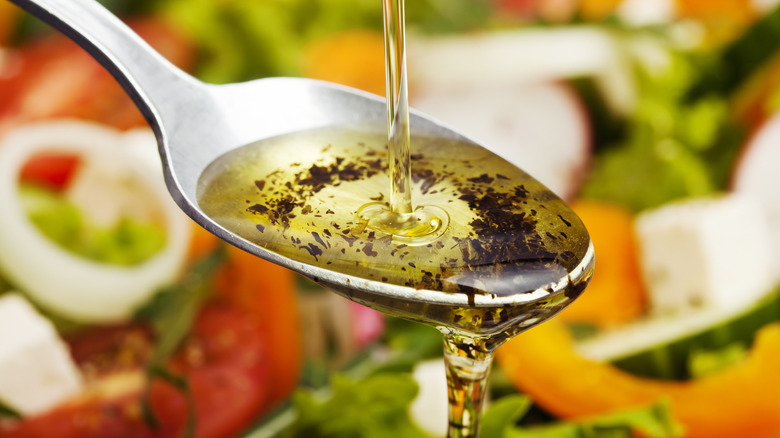To Save A Bit Of Cash, Use Vegetable Oil Instead Of Olive Oil For Dressings
We're all looking for ways to cut costs at the grocery store these days as prices from the produce section to the freezer aisle continue to skyrocket due to inflation. Higher-end oils such as extra virgin olive oil can easily be one of the pricier items on your grocery receipt. No one would blame you for wanting to save it for special occasions and reaching instead for cheaper alternatives whenever possible. One creative way to save money and not lose out on flavor or taste is to use an affordable substitution such as vegetable oil in your homemade dressings. This will let you save the extra virgin olive oil for pasta or an herby oil dip where its flavor will be most noticeable.
For a simple homemade salad dressing that consists of oil, vinegar, a dollop of honey, dijon mustard, and herbs, cheaper oils will absolutely get the job done without sacrificing taste. Ounce for ounce, a bottle of basic vegetable oil, typically derived from soybeans, can be many dollars cheaper than an equivalent-sized bottle of olive oil. If you're comparing a standard vegetable oil to a higher-end, unrefined bottle of extra virgin olive oil, your savings could be even greater. Other options, like canola, safflower, or rapeseed oil, all tend to be cheaper and have a mild, forgiving flavor that makes them good candidates to use in any dressing recipe where you don't want the oil's flavor to be dominant.
How vegetable oil compares in taste and nutrition
In terms of taste, substituting olive oil for a more economical option will be slightly noticeable for those with discerning taste buds. Olive oil (especially the richer, extra virgin type) will lend a more robust, fuller flavor to your dressings compared to more neutral vegetable oil. But, with the addition of add-ins like garlic, spices, salt, and sweetener, there's no reason you can't still achieve a tasty homemade dressing with a kick, so long as you're not only relying on the flavor of the oil itself.
For those not only watching your wallet but also concerned with nutrition, worry not. Olive oil has a glowing reputation for its health benefits — mostly due to its high concentration of antioxidants and phytochemicals linked to heart health and lowering inflammation. Comparatively, vegetable oil can't quite compete with olive oil's glowing nutritional breakdown, but it is certainly nothing to avoid. Regardless of the type of oil you choose, when consumed in moderation — such as in small quantities in a salad dressing — all oil can be used and enjoyed without stress.
Whether you're blending up a quick citrusy vinaigrette, an Italian dressing, or a creamy green goddess dressing, consider saving the costly stuff. By using cost-effective swaps like vegetable, sunflower, or even canola oil, it's easy to still create flavorful, lively salad dressings and put that saved bit of cash toward what really matters, like that fresh lettuce blend or fancy cheese.

